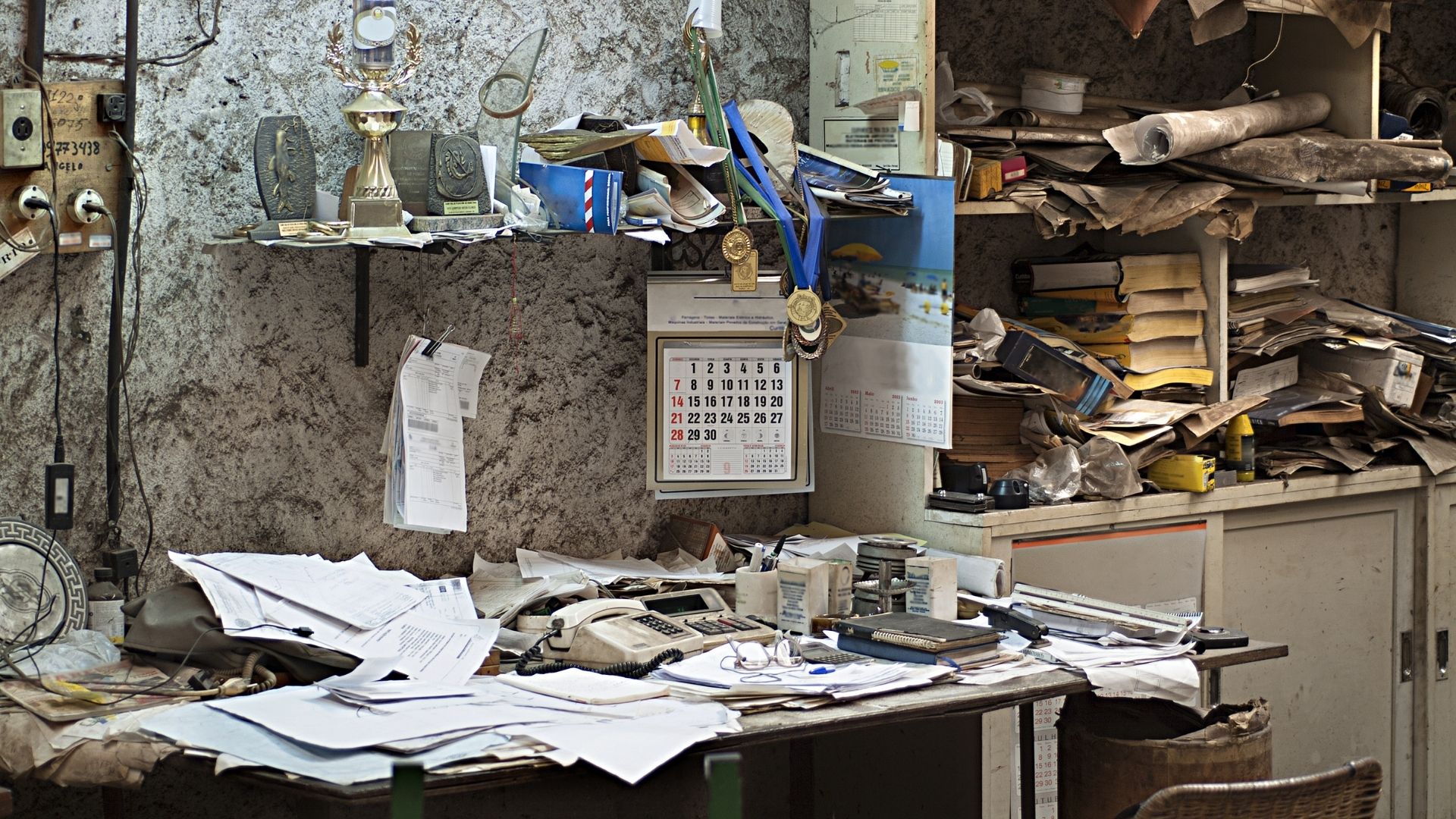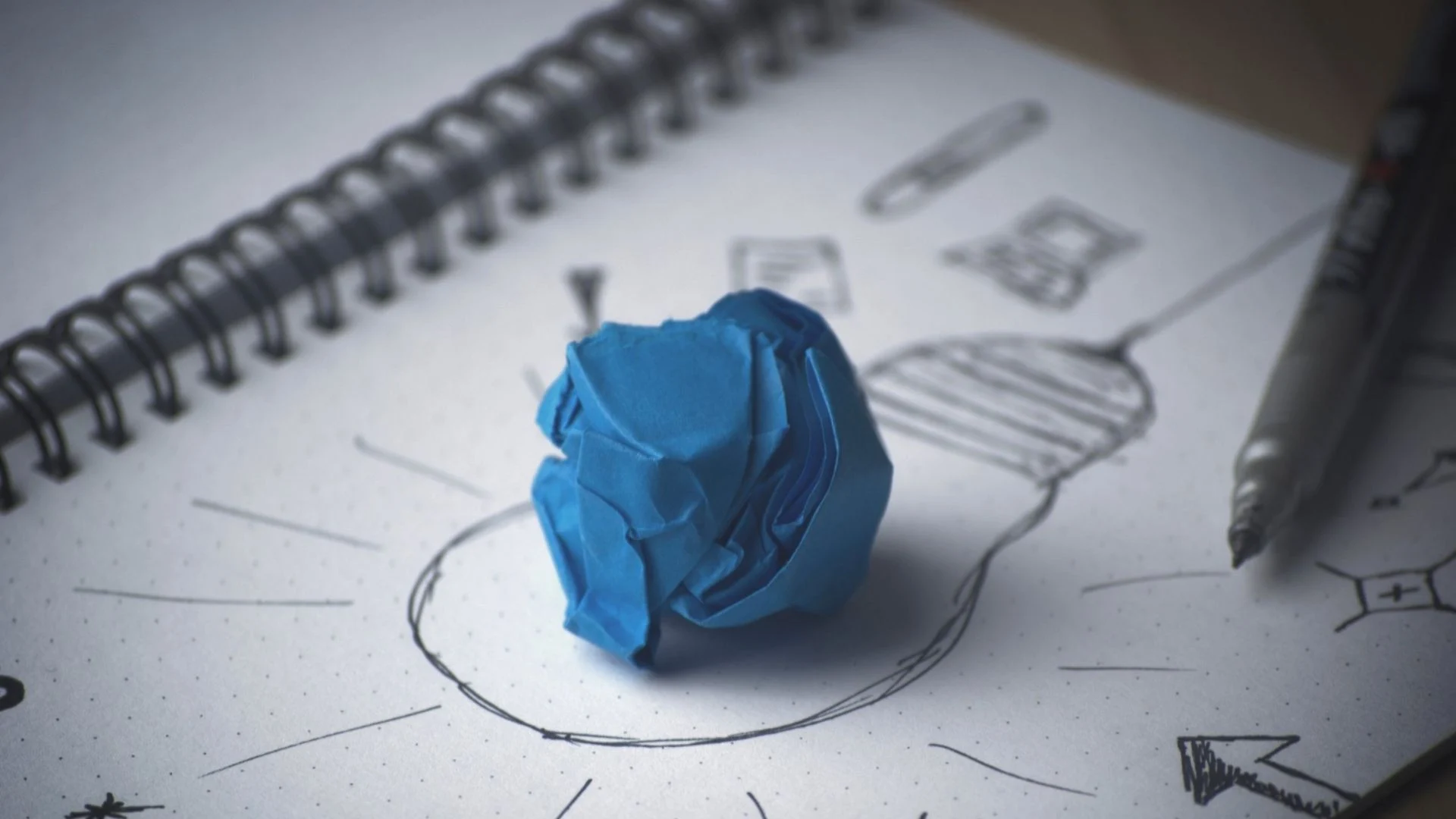Sign-Up For The NeuroGym Newsletter And Join The Innercise Revolution!
We value your privacy and would never spam you.
Featured
Albert Einstein was a genius, but his office was a mess! He was excellent at what he did, so one has to wonder whether his chaotic workspace could have caused mental clutter.
What about your office? Is it organized or chaotic?
And what about your mind? Are you free to think clearly, or do you have to wade through clutter to find your thoughts?
Everyone wants to know how the mind of a genius works, so when Einstein died in 1955, a journalist captured his Princeton office in a photograph.
The desk in the middle of the room is packed with papers, textbooks, and journals. Barely any of the desktop is visible between the clutter, but a tobacco tin and pipe stand out among the details.
The blackboard, filled with equations, is framed by two bookshelves. One side is disorganized with books stacked on top of each other and falling over. The other side is more orderly to the naked eye.
The muddled room begs the question: How did Einstein get any of his amazing work done?
Einstein’s office made scientists wonder whether there is a connection between clutter and intelligence. A group of researchers at the University of Minnesota recently did a study on this topic, and the results are remarkable.

Participants in the experiment sat down in an office that was either tidy or messy. They had to complete a survey, brainstorm, and choose a snack.
Individuals who worked at the disorganized desk came up with more creative ideas, chose novel ideas, and opted mostly for chocolate. Participants seated at an orderly desk made conventional decisions, didn’t think outside the box, and tended to choose an apple.
Neither of these options are bad, as each has its perks, but it’s clear that clutter might lead to greater creativity.
Messy offices are nothing new to masterminds—several other big thinkers also prospered in disorganization. Mark Zuckerberg, the creator of Facebook; Steve Jobs, the founder of Apple; and the author, Mark Twain, all had cluttered workspaces.
So what does your workspace look like? Don’t worry if it’s messy: You might just create the next thing that changes the world!
How much do you really know about yourself and your brain’s unique functioning? We have the tool for you if you want to know more about all this and more. Join us for the Brain-A-Thon and open your mind to new possibilities.
While a disordered desk is okay, a cluttered mind can be destructive.
Your brain doesn’t function well when it is jam-packed with all kinds of thoughts and emotions. The neurotransmitters can’t send proper messages, synapses get confused, you can’t do tasks constructively, or you can’t think clearly.

Some days, you might struggle to focus on work or getting household activities done. If you spend a couple of minutes and reflect on the situation, you’ll probably find your brain is overwhelmed with thoughts and emotions.
What are your thoughts and emotions about?
It could be worry or anxiety. Uncertainty about the future leaves you feeling like you have a lack of control. Worrying won’t get you anywhere because it results in passiveness; you have to turn that stress into fuel to do more.
Your mind could be filled with guilt or shame about mistakes you made in the past. Frequently, negative self-talk accompanies these thoughts. It creates a spiral of limiting beliefs, negativity, and a lack of confidence. You need to break free from these ideas by changing the way you think.
Imagine you need to get quickly from one point to another. You are walking fast but come across stairs, a boulder, frightening animals, and other hurdles along the way. All of this slows you down, and the same happens with a cluttered brain.
Your brain is filled with neural networks and paths that each have a specific function. Messages can only be transmitted through these pathways if your brain is free of fear, anxiety, and overwhelming thoughts.
Neurotransmitters see clutter as obstacles, and they have to work harder to get thoughts across. It leaves you with muddled thoughts and confusion which prevent you from seeing things objectively. You can’t function optimally, be creative, or think clearly which limits your potential.
Whether your desk is tidy or messy doesn’t matter. You need to focus on having a clear brain, improving your creativity, and making intelligent decisions. When you do this, your confidence grows, and you are ready to find solutions.
Here are some ways to boost your imagination.
Identify your true passion and determine what you want to get out of your life. Set goals for yourself to make your vision come true, and take actionable steps to make it a reality.
A clear plan allows you to structure your thoughts instead of trying to figure out what you are meant to do. It gives you a reason to get out of bed each day and make the most of every hour.
Reading the news; hearing about new inventions or products; and learning about something you don’t know are all ways to stimulate your mind. Even taking up a hobby or watching a movie can trigger creative thoughts.
Learning allows your brain to build new ideas and neural pathways. It encourages your critical thinking and problem-solving skills. Commit to spending some time daily to learn, and see how it changes your thoughts.
Most of us brainstorm daily tasks or creative ideas by making to-do lists, writing in a journal, or scheduling things in a diary. It limits us to words, but there is so much more you can do to engage your brain creatively.
Try your hand at doodling; making mind maps or flowcharts; or creating a visual representation of your ideas. Discuss your thoughts with other people, and create a vision board to inspire you.

Boosting your creativity and intelligence doesn’t have to be a challenge. All you need to do is sign up for the Brain-A-Thon where the world’s top brain experts will reveal the secrets to the mind. It’s a life-changing event, so you don’t want to miss it.
You know how to become more creative and come up with ideas. You know your messy workspace is okay, so now you need the final piece of the puzzle—learning how to get rid of the clutter in your brain.
Sometimes, your mind runs over with thoughts, and you can’t decide what to focus on. This is a good time to grab a journal and write down everything that is spinning around in your brain.
Start by writing down the first thought that pops into your head and continue from there—even if it seems like rambling. Consider this process like taking out the trash: You are making space for more constructive thinking.
Mindfulness requires that you put away any distractions or disruptive thoughts while you focus on the current moment and what it requires from you. It takes some practice, but it helps you to concentrate much more on one thing at a time with the knowledge that you will get to the rest of your thoughts later on.

Being active helps your body to release stress and toxins associated with it. Exercise also boosts your mood as your body produces feel-good hormones.
Dedicate time each week for movement. Do a couple of stretches during your breaks, join a yoga class, or go for a run to clear your mind.
Talking to someone you trust about your thoughts and feelings can help you to deal with them constructively. Chat with a close friend, a family member, mentor, or make an appointment with a professional therapist.
Discussing what’s on your mind allows you to air your thoughts. The other person can also help you to see things from another perspective.
Music enhances mood and helps you to concentrate more, so it’s a great way to clear negative emotions from your brain. Listen to music frequently, sing along, or play a musical instrument during your breaks. It makes your soul smile and improves neuroplasticity.
When your emotions become overwhelming, your brain cannot think logically. It’s a clear sign that you need to slow down for a few minutes.
Stop what you’re doing, take several deep breaths, and release your emotions. Do something else—even if it’s just for five minutes. You could try playing with your pets, taking a walk, or reading a book. This will help clear your mind of its mental clutter.
Your brain cannot think clearly if you don’t give it time to rest. The brain doesn’t switch off while you sleep, but it does get a break which is important for it to function properly. Ensure you get eight hours of sleep daily.
A great way to declutter your mind is to rewire it entirely. If you think differently and focus on positivity, you allow yourself to think better and do more. At the Brain-A-Thon, we explore these concepts in great detail and give you the techniques to overhaul your brain. Secure your spot today!

NeuroGym Team: NeuroGym’s Team of experts consists of neuroscientists, researchers, and staff who are enthusiasts in their fields. The team is committed to making a difference in the lives of others by sharing the latest scientific findings to help you change your life by understanding and using the mindset, skill set and action set to change your brain.
We value your privacy and would never spam you.